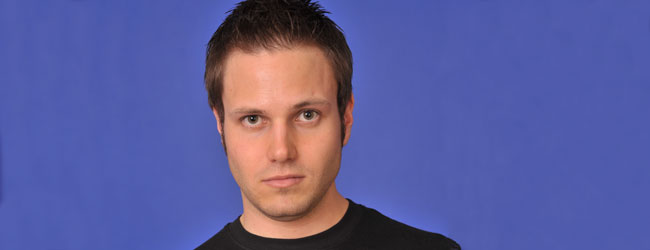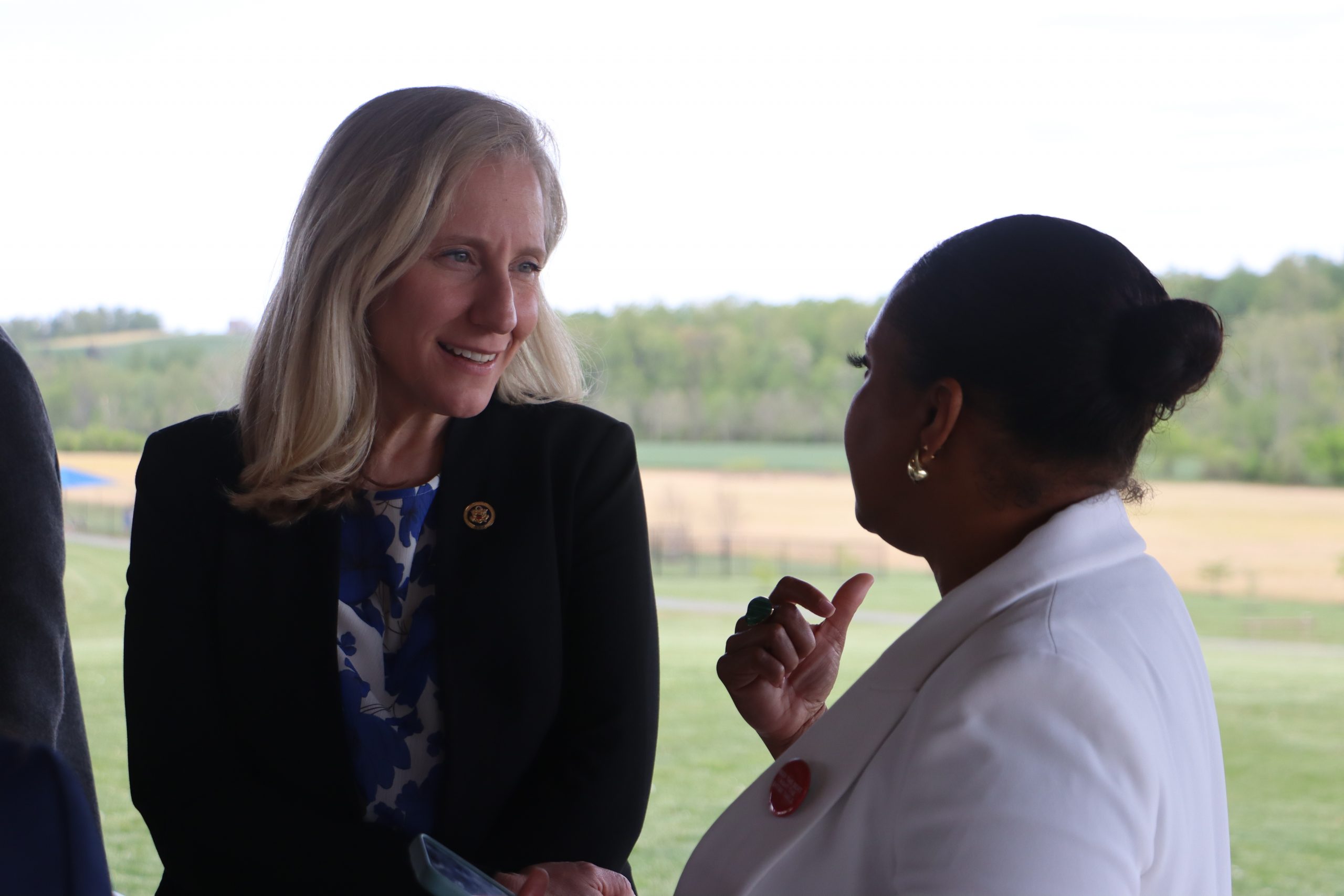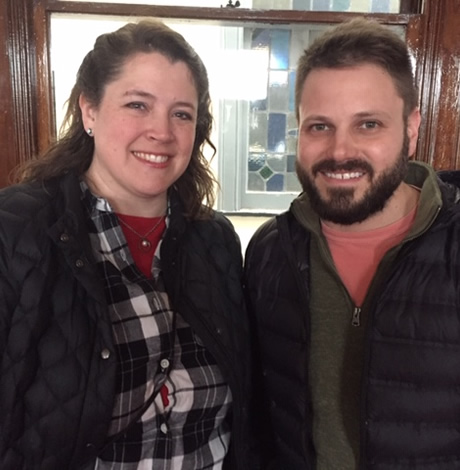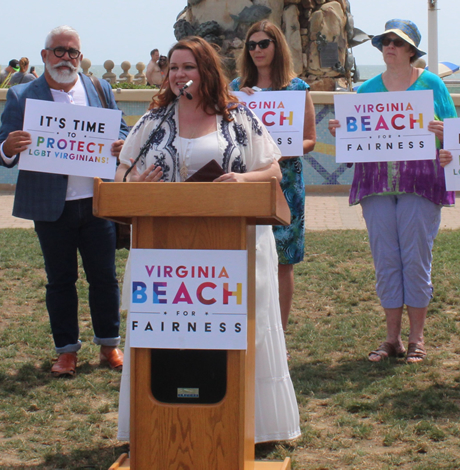Local
Gay Discovery hostage shares story
Former Blade staffer on how life has changed since terrifying standoff

A gay man who was one of three hostages held at the Discovery Channel headquarters in Silver Spring, Md., on Sept. 1 used hand signals to initiate his and a fellow hostage’s escape seconds before police shot and killed a gunman who threatened to blow up the building.
Christopher B. Wood, 25, a former Washington Blade employee who works as a marketing specialist with Discovery Communications, gave a harrowing account of his four-hour ordeal in captivity at the hands of a disturbed gunman that has attracted national media coverage.
Seconds after Wood and Discovery Channel producer Jim McNulty ran for the exit door in a plan orchestrated by hand signals between Wood, McNulty, and a security guard who was also held hostage, members of a police swat team shot and killed the gunman, James Lee.
Authorities described Lee as a disturbed “environmental extremist” who believed the Discovery Channel was broadcasting harmful programs that would worsen global warming and other environmental problems.
In an interview with the Blade, Wood explained how he was able to clandestinely respond to a text message that a co-worker sent him from outside the building. Wood said the text message came at a time when he believed he would likely die at the hands of the gunman, who had explosives strapped to his body.
“Please tell Mark I love him,” Wood told co-worker Carlos Gutierrez in a text message referring to Wood’s partner.
About two hours later, while thinking of his partner Mark and other loved ones while being forced to lie face down on a marble floor in the Discovery building’s lobby, Wood said his fright and anxiety began to change to anger.
“I started to think in my head…no, this is not the way this is going to end,” he told the Blade in discussing his thoughts of a plan to escape. “I’m not going to die here on the floor. I’m not going to let somebody take over my life and tell me when I’m going to die.”
According to Wood and accounts by authorities, both Wood and fellow hostage McNulty walked into the Discovery building lobby shortly after returning from their lunch break about 1 p.m. on Sept. 1. McNulty said he saw Lee pointing his gun at the building’s lobby security guard and initially thought the two were actors participating in the filming of a movie until Lee pointed the gun at him and ordered him to lie face down on the floor.
Wood said he first noticed McNulty lying on the floor when he entered the lobby minutes later and thought McNulty was ill and wondered why someone wasn’t helping him. Before he could take more than a few steps, Wood said Lee pointed the gun at him and ordered him to lie on the floor.
During their four hours in captivity, Lee forced Wood and McNulty to remain on the floor except for times when he ordered them to stand and answer his questions about the plight of the earth, Wood said. Wood said the security guard remained at a desk where there was a phone that police hostage negotiators used to talk to Lee on and off throughout his stay in the building’s lobby.
Wood said he sized up Lee’s state of mind after hearing him talk to the negotiators through a speakerphone, where both parties could be heard.
“[T]he negotiator was asking how the hostages were,” said Wood. “And he kept saying, ‘I don’t care about these hostages. I don’t care if they die. I don’t care about them. I just care about what I want…If I blow up it will take all of them with me.”
Wood said that Lee “ranted” at McNulty after asking McNulty if he had kids. When McNulty told him he had two children Lee shouted that having children contributes to overpopulation, which is destroying the natural environment, according to an account by McNulty in media interviews.
When Lee called Wood over to the guard’s desk to question him, Wood said he had determined he would try to say as little as possible to avoid antagonizing Lee.
“So the gunman [said], ‘Stand up, you stand up. Put your hands on the desk,’” Wood said. “I walked up over to the desk, put my hands on the desk. And he [said], ‘He looks fine. Look at him, young, healthy.’”
From that point on, Wood said, Lee allowed him and McNulty to remain standing. It was at that time that Wood noticed the guard making subtle gestures that Wood thought suggested that he and McNulty should attempt to “make a run for it.”
“I looked at the guard,” said Wood. “I finally got his attention and I mouthed the word ‘run.’ And he shook his head yes. And so I then turned my body trying to get Jim’s attention.”
After what seemed like an eternity, Wood said, McNulty looked toward him “and I mouthed the word ‘run.’ He shook his head yes.”
Wood said he then began counting down with his fingers to McNulty with his body turned so that Lee could not see his fingers counting down from three to one, when the two would bolt for the door.
“And as soon as the gunman looked down toward the negotiator [on a speaker phone] I dropped my arms and ran to the same door that I came in,” he said, noting that he heard the sound of a “pop.”
Although he did not witness it, Wood learned later the sound he heard was the first of several shots fired by the Montgomery County police swat team. Police said members of the swat team, who entered the building earlier and were ready to rush into the lobby, shot Lee several times, killing him instantly.
“I’m not sure what the next chapter holds,” Wood said. But I will say that I have a whole new perspective on life. I went from dying and thinking I was dead to making a decision to live, making the decision to be the one that got us out of there safely and ran and made the initial stand. And my life will never be the same.”
A transcript of the Blade’s interview with Wood follows:
Washington Blade: Can you describe how it happened that you walked into this hostage situation on Sept. 1 at the Discovery Channel headquarters in Silver Spring, Md.?
Chris Wood: I had my one o’clock and my noon [meetings] cancelled so I decided I was going to go out and grab a quick lunch. And I did right in downtown Silver Spring. I was walking back to the lobby taking my iPod headphones out of my ears, putting everything into my hands getting ready to walk into the lobby. I walked into the first door — it’s double doors. I opened the first door and started walking in and realized somebody was laying face first on the ground. And I looked to the left and I noticed a bag that I guess belonged to an individual and I recognized the bag was my co-worker Jim McNulty. And I looked back at the person laying face first on the ground and I put it together that it was Jim laying on the ground and that was his bag. By this point I’m reaching for the second door and basically looking up toward my left toward the reception desk trying to see why isn’t anyone helping him? What’s going on? And as I’m looking up to the left the gunman is wielding the gun at me saying, ‘Get on the ground, get on the ground.’ This was while I was walking into that second door. And I immediately switched everything from my left hand to my right hand — my iPod and my Blackberry and went down to the ground on the cold marble.
Blade: And this was in this very expansive lobby of the Discovery Channel headquarters?
Wood: Yes it is.
Blade: After that initial command, did the gunman say anything to you?
Wood: No. At this point he had gone back to the guard and he was continuing to assemble the device that was strapped to him. And as I was on the ground, I was looking up to the left looking at him and the guard and what was going on. Eventually, my phone kept going off in my right hand. I kept trying to answer it but I wasn’t looking at my phone. My head was to the left paying attention to the gunman and the other two hostages and I kept trying to answer it and answer it every time it rang or buzzed and eventually he asked Jim to get up. Jim got up and he was asking him questions.
The NBC reporter had called in that time [to the guard desk]. He was the first phone call in. The gunman eventually thought that that NBC reporter was a cop and ended up hanging up on him. But while he was asking Jim questions, Jim became in between the site of the gunman and I so the gunman could not look over and see me. I took my phone out of my right hand and switched it over to my left hand above my head while still lying on the floor. And the first thing I did was saw that my boss had called and I called the number back. Whoever was on the other end of that phone listened for two minutes and hung up.
And then I looked at my e-mail and saw that my boss wrote me an e-mail that said, “Are you O.K?” And I wrote back and said I’m a hostage with Jim McNulty and the guard in the lobby. And then I had two more text messages come in, one from a friend that works at Discovery. I texted him back and said I’m a hostage in the lobby. And my second text message to him was please tell Mark I love him. Mark is my partner.
… So I sent out the phone call and two text messages and at that point the gunman had finished his conversation with Jim and told Jim to get on the ground. And eventually he asked me to get up and walk over to the desk.
He asked me an array of questions. The first thing he said to me was you look like a strong man. And then he said, “What do you do here?” And I lied and I said I’m admin. And he said, “Admin, what is admin? What do you do?” And I said I file papers. Obviously, I lied. I didn’t want him to know what I did. I didn’t want him to know that I worked for a particular channel. I didn’t want him to know that I worked in the marketing department because of the way he was going on and ranting off and on with the negotiator and the NBC reporter that I heard earlier. And then he asked me, “Are you in the military?” I said no. He’s like, “Look me in the eyes when I talk to you. I looked at him twice and answered two of those questions. He said, “Do you plan on having kids?” I said no. And he’s like, “Can you promise me you’ll never have kids?”And I said yes. Basically just giving him any answer that would get him to leave me alone and satisfy what he was asking.
Blade: Did he ask you if you were married?
Wood: No he did not … Eventually by giving him one-word answers he’s like, “I’m bored with you. Go lay back down.” So I started to walk back towards my stuff. He’s like, “Right there on the ground.” I laid down first and he said, “Turn around the other way so I can see you.” So I laid down the other way and he asked Jim to get up at that point. It was about three o’clock. Jim stood up. He continued to have a lot of questions for Jim, asking him about his kids, about his family, about what he did and ranting back and forth with the negotiators. You know, getting really annoyed at the negotiators. So eventually I was laying there and my arms and hands started to fall asleep and went through a range of emotions when I went down to the ground for the second time. I was really upset when I laid back down. I was crying.
In my mind I was thinking this is the end, this is the end of my life. This is what my life has come to. I got really upset and started to get really mad. And the fact that somebody could take this power away from me and he’s going to decide when I lose my life. I started to thinking in my head. I’m like, “No this is not the way this is going to end. I’m not going to die here on the floor. I’m not going to let somebody take over my life and tell me when I’m going to die.” My arms at that time started to fall asleep on the cold marble floor. So I started moving my hands just trying to get them to wake up …
I guess I had been lying there for quite a while. And the gunman was on the phone with the negotiators and the negotiator was asking how the hostages were. And he kept saying “I don’t care about these hostages. I don’t care if they die. I don’t care about them. I just care about what I want. You have my demands. I want this done and I don’t care if they die. If I blow up it will take all of them with me.” And the guard said he hasn’t moved in a while and he pointed at me on the floor. So the gunman was like, “Stand up, you stand up. Put your hands on the desk.” I walked up over to the desk and put my hands on the desk. And he’s like, “He looks fine. Look at him, young, healthy.” And he went back to talking to the negotiators. I eventually let my hands slowly slip off the desk. We were able to move about freely quite a bit. My legs were hurting, my back was hurting.
Blade: You mean at that time he allowed you to walk around in the lobby?
Wood: Not walk around — we were staying in place but I could move my arms, I could fold my arms. I could scratch my face. He wasn’t restricting our movement in our place. So I started watching the guard standing behind the desk … the gunman was there talking on the speaker phone with the negotiators. The guard is behind the desk. Jim and I were off kind of in front of the desk but toward the right hand side. I looked at the guard and he’s making hand signals — not looking at me, making like taking two fingers and wiggling them like legs and I couldn’t figure it out and I finally just got it in my head that this is the opportunity to run, this is our chance to run. He’s on the phone with the negotiator. We can make it. We can do this. I looked at the guard. I finally got his attention and I mouthed the word “Run.”And he shook his head yes. And so I then turned my body trying to get Jim’s attention. Jim had no idea it was me until I stood up next to him that last and final time. It was about four o’clock. It was about an hour before the incident ended.
Blade: At the time you were thinking about making a run for it, were you and Jim both standing at that moment?
Wood: Yes. Jim, myself and the guard were standing.
Blade: How long were you standing?
Wood: For the last hour we were standing … So Jim finally looked over at me and I mouthed the word “Run.” He shook his head yes. I crossed my arms and took my left hand it tucked it underneath my right arm so that the gunman couldn’t see my fingers but Jim could. And I held up three fingers. And I started to put one down in a countdown but got nervous because the gunman looked at me. I put it back up and then he looked away and I started counting down again. I put one finger down and I put the next finger down and I put the final finger down and I froze. I looked at Jim, I looked at the gunman and the gunman was looking right at me. And as soon as the gunman looked down toward the negotiator I dropped my arms and ran to the same door that I came in. I hit that first door with my right palm. I hit the second door with my right hand palm. In between the first door and the second door I heard a pop. I didn’t know what it was. And I went out, straight out around a pole that was probably 10 feet wide or so or eight feet wide. And as I was rounding the corner there were like five police officers …
… I’m not sure what the next chapter holds. But I will say that I have a whole new perspective on life. I went from dying and thinking I was dead to making a decision to live, making the decision to be the one that got us out of there safely and ran and made the initial stand. And my life will never be the same.
Blade: Do you eventually think you will go back to work at the Discovery Channel?
Wood: I would like to. At this time I just don’t know when.
Blade: Are you on some form of leave from work?
Wood: They’re just providing assistance and providing everything to me —everything that I need. They have not — my job is there and that still stands. But other than that I really can’t comment on much of how they’re proceeding with everything.
Blade: What is your official title there and what have you being doing?
Wood: I’m a marketing specialist for TLC Strategic Marketing.
Blade: Can you remind me the time period you were with the Blade?
Wood: August 2009 was when I was laid off. And I came in December of 2007.
Blade: And were you also a marketing person?
Wood: Yes, I was marketing manager….
Blade: Was Lee, the hostage taker, interrogating Jim McNulty before you about things like his having kids and things like that?
Wood: Yes, he interrogated him first because Jim stood up first and then he laid him back down and got me up and interrogated me.
Blade: Did you have any thoughts about how he would react if he knew you were gay?
Wood: I didn’t know how he would react but I most certainly wasn’t going to antagonize him or bring it up if he didn’t bring it up.
Blade: Do you have any other thoughts that might be important that I didn’t ask about?
Wood: It’s just the support from the community, from friends, from the Discovery Channel — it’s all been amazing and overwhelming. It really makes me think about life and how not to take it for granted. A lot of people take life for granted and you just really can’t because you never know what’s going to happen.
Blade: Has the support come through calls, e-mails and on Facebook — things like that?
Wood: I kept myself very sheltered. The media was very overwhelming and so I didn’t have a phone for a week because it became part of the investigation. I had left it on the floor and didn’t have a phone for a week. And everybody was communicating through friends. I wouldn’t log onto Facebook. I wouldn’t go anywhere. Now it’s starting to become e-mail and phone but for about a week — a week and a half I wouldn’t communicate with anybody.
Blade: Have you had a chance to go out at all to the clubs or anywhere else?
Wood: I have not gone out at all.
Blade: You want to wait until you’re ready to do that?
Wood: I wanted to do the media because I want to explain the story a couple of times. I don’t want to explain it 3,000 times.
Virginia
EXCLUSIVE: HRC PAC to endorse Spanberger for Va. governor
Former congresswoman to face off against state’s GOP lieutenant governor

The Human Rights Campaign PAC on Tuesday will endorse Democratic nominee Abigail Spanberger’s run for governor of Virginia, the organization told the Washington Blade.
The former CIA agent-turned-congresswoman, who represented her state’s 7th Congressional District from 2019 to 2025, will face off against Republican Lieutenant Gov. Winsome Earle-Sears in this year’s gubernatorial race.
A Roanoke College survey in February found Spanberger in the lead with a comfortable margin, 39-24, while a trio of polls in January found her ahead by one, five, and 10 percentage points.
Virginia’s incumbent Republican Gov. Glenn Youngkin, who is prohibited from seeking a second term under the state’s constitution, has consistently restricted LGBTQ rights and attacked the transgender community since taking office in 2022.
HRC said Spanberger’s candidacy “offers Virginians renewed hope for a future rooted in equality,” with the group’s president, Kelley Robinson, calling her “a champion for the LGBTQ community.”
Noting the former congresswoman’s co-sponsorship of the Equality Act, legislation that would expand federal anti-discrimination protections to include LGBTQ people, Robinson said Spanberger “understands that Virginia’s future success depends on the full inclusion and protection of all its people.”
HRC’s president added, “As governor, she will work tirelessly to build a Virginia where everyone — regardless of who they are or who they love — can live, work, and go to school with dignity, safety, and opportunity. We are thrilled to support her and mobilize pro-equality Virginians to make her the commonwealth’s next governor.”
Responding to news of the endorsement, Spanberger said “I’m honored to earn the endorsement of the Human Rights Campaign, and I’m ready to work together to build on the progress we’ve made to secure equal protections for all Virginians under the law.”
“Affirming that Virginia is a welcoming home for all families goes beyond protecting marriage equality — it means defending Virginians’ right to live without fear of discrimination or harm,” she said. “As governor, I will work to make sure that no Virginian is denied government services, loses a job, or faces any other form of discrimination because of who they love or who they are.”
HRC further noted that Spanberger fought to pass the Respect for Marriage Act, which was signed into law in 2022 and codified legal protections for married same-sex and interracial couples, as well as her promise to “defend marriage equality and work with the General Assembly to enshrine marriage equality in Virginia’s constitution.”
Spanberger has also committed to “signing legislation guaranteeing Virginians’ right to access contraception and birth control,” HRC wrote, “and protecting against attempts by extreme judges and politicians to roll back Virginians’ reproductive freedoms.”
By contrast, the organization criticized Sears’s LGBTQ rights record — noting that in 2004, she pledged to “emphatically support a constitutional amendment” banning same-sex marriage, in 2021, she campaigned with a gubernatorial candidate who said homosexuality was the “work of the devil,” and in 2022, she “dodged questions” about her position on marriage equality and “attempted to rewrite her hateful history.”
Since 1977, with only one exception, Virginia has elected governors who belong to the party that is out of power at the presidential level. The state’s upcoming off-year gubernatorial contest presents an opportunity for Democrats who are eager for a major electoral victory to channel momentum against President Donald Trump and Republican majorities in Congress.
District of Columbia
Gay Men’s Chorus of Washington to celebrate Spring Affair honorees
‘Their work inspires our music and deepens our mission’

For 44 years, the Gay Men’s Chorus of Washington (GMCW) has served as a powerful voice for love, unity, and pride among Washington’s LGBTQ community and its allies. Since its first performance in 1981—at the opening of the National Gay Task Force’s Washington office (later becoming the National LGBTQ Task Force)—GMCW has built a politically engaged and culturally significant legacy as one of the nation’s foremost LGBTQ performing arts organizations.
As its music and mission evolved, GMCW deepened its involvement in supporting LGBTQ individuals and allies alike. In 2004, the chorus launched its first Spring Affair fundraiser. This annual event not only generates financial support for the inclusive choral group, but also honors individuals and organizations in the Washington community who exemplify GMCW’s mission of unity, equity, and empowerment through music.
Each year at the Spring Affair gala, the chorus honors one community leader, one external organization, and one GMCW member. For the 2025 gala, GMCW will recognize Bishop Mariann Edgar Budde, Atlas Performing Arts Center, and GMCW member Keygan Miller.
“These honorees remind us why we sing,” said Thea Kano, artistic director of the Gay Men’s Chorus of Washington, DC, in an email. “In moments when our community has needed strength, they’ve offered hope. Whether it’s a brave voice from the pulpit, a tireless advocate for our youth, or an organization that opens its doors to every story—each has chosen to lead with love, truth, and courage. Their work inspires our music and deepens our mission.”
GMCW will honor Bishop Mariann Edgar Budde, the first woman elected to lead the Episcopal Diocese of Washington, as its 2025 individual award recipient. A longtime champion of equity and inclusion, Bishop Budde gained national prominence during the Inaugural Prayer Service at Washington National Cathedral, where she spoke directly to newly sworn-in President Donald Trump.
“Have mercy, Mr. President,” she implored, lifting the hopes of the most vulnerable Americans targeted by Trump’s policies—particularly LGBTQ and immigrant communities. Her bold words signaled to the nation that she remains a genuine and outspoken voice for justice, unity, and truth, inspiring compassion and faith within and beyond her religious community.
GMCW will present the Harmony Award for an Organization to the Atlas Performing Arts Center, located in the historic H Street, N.E. corridor. In 2024 alone, Atlas hosted more than 400 events and provided $1.6 million in free and discounted tickets, arts education, community programming, and space use. Through this work, Atlas has amplified “artistic voices that reflect the full diversity of our community.”
The center has long partnered with GMCW, offering space for open mic nights, cabarets, GenOUT Chorus events like the Youth Summit, and even memorial services such as that for Bobby T. Boaz. Atlas exemplifies GMCW’s mission of storytelling, equity, and civic connection through programs like the INTERSECTIONS Festival and City at Peace.
“We are absolutely thrilled and deeply honored that the Atlas Performing Arts Center has been named a recipient of the GMCW Harmony Award! This recognition is a powerful affirmation of our commitment to uplifting voices, fostering inclusive creative expression, and building a space where everyone feels seen, heard, and celebrated,” said Jarrod Bennett, Executive Director of the Atlas Performing Arts Center.
“At the Atlas, our mission is rooted in the belief that the arts are for everyone—and that through performance, dialogue, and community, we can help shape a more just, compassionate world. To be acknowledged by the Gay Men’s Chorus of Washington, DC—an organization that has long stood at the forefront of championing equality and advancing the well-being of the LGBTQ+ community—is a profound and humbling honor. We continue to be inspired by GMCW’s work and are proud to stand alongside them in this shared vision. Thank you, GMCW, for this beautiful recognition. We carry it forward with gratitude and renewed energy for the work ahead.”
Finally, GMCW will honor Keygan Miller, a chorus member since 2017, for their leadership, advocacy, and commitment to equity both onstage and off. Within GMCW, Miller served as Vice President of Diversity and Inclusion, led conversations to expand trans inclusion, authored the “Day One” pledge, and played a critical role in shaping inclusive programming.
Outside the chorus, Miller serves as Director of Public Training for The Trevor Project, a national nonprofit focused on crisis intervention and suicide prevention services for LGBTQ youth under 25. They previously worked as an Advocacy Manager at the Trevor Project, where they championed policies protecting LGBTQ+ youth at every level of government.
As GMCW continues its mission to uplift and unite through music, the organization encourages new voices to join its ranks. GMCW welcomes all singers—regardless of gender identity or sexual orientation—who can sing in the lower vocal registers.
The 2025 Spring Affair Gala will take place on May 17, 2025, at The Ritz-Carlton, Washington, D.C. This annual benefit supports GMCW’s artistic and educational programming. For tickets, audition information, and more, visit GMCW.org.
District of Columbia
Activists stage reenactment of 1965 gay rights protest at White House
Event marked 60th anniversary of historic picketing

With dozens of tourists watching, a little over two dozen LGBTQ activists walked in a circular picket line carrying “homosexual rights” signs on the sidewalk in front of the White House on April 17 in a reenactment of the historic 1965 first gay rights protest outside the White House.
Organized by D.C.’s Rainbow History Project, the event marked the 60th anniversary of the 1965 protest, which was organized by gay rights pioneers Frank Kameny and Lilli Vincenz on behalf of the Mattachine Society of Washington, one of D.C.’s first gay rights groups that Kameny co-founded in the early 1960s.
“The White House picket is the origin story for public demonstrations for gay rights in the U.S., and the origin story for Pride marches and the annual LGBTQ Pride celebrations which occur across the globe,” according to a leaflet prepared by Rainbow History Project that participants in the reenactment handed out to passersby and tourists.
Among those participating in the reenactment protest was longtime D.C. LGBTQ rights advocate Paul Kuntzler, who is the last known survivor of the 1965 White House gay rights protest. Kuntzler carried a replica of the sign he said he carried at the 1965 protest, which states, “Fifteen Million U.S. Homosexuals Protest Federal Treatment.”

Other signs carried by participants stated, “Homosexuals Died for Their Country, Too;” “White House Refuses Replies To Our Letters – Afraid Of Us?”; “Cuba’s Government Persecutes Homosexuals, U.S. Government Beats Them To It;” “Homosexuals are American Citizens, Too.”
The leaflet that participants distributed at the April 17 reenactment, which includes a photo of the 1965 event, lists what it says were the four main demands issued by the Mattachine Society of Washington in 1965.
They called for an end to “the exclusion of homosexuals from federal employment,” an end to the ban on gays from serving in the U.S. military, an end to the “blanket denial of security clearances for gay people,” and an end to the government’s refusal to meet with the LGBTQ community or to reply to their letters.
The leaflet includes an excerpt from a letter that Kameny wrote to then-President Lyndon B. Johnson around the time of the 1965 protest.
“We ask you, Mr. President, for what all American citizens – singly and collectively – have the right to ask,” the letter states. “That our problems be given fair, unbiased consideration…consideration in which we, ourselves, are allowed to participate actively and are invited to do so.”
The leaflet notes that although Kameny died in 2011 and Vincenz died in 2023, “their legacy is carried on by modern LGBTQ+ rights activists, who continue to advocate for employment opportunities, legal protections, inclusive health services, and more.”
Rainbow History Project official Vincent Slatt, one of the lead organizers of the reenactment protest, said his group had no trouble obtaining a permit from the National Park Service to hold the event outside the White House.
“I think the picket is going very, very well today,” he said while watching the picketers on the White House sidewalk. “We have a couple of dozen people participating. And there are lots of tourists engaging,” he said. “We’re handing out pamphlets to let them know about the historic picket and the importance of learning LGBT history.”
Slatt added, “But the highest impact is really that the media showed up to spread awareness of this.”
Lesbian activist Leticia Gomez, while walking on the White House picket line at the reenactment event, said she was among those who benefited from the 1965 protest and those that followed in support of LGBTQ rights.
“I’m blessed,” she said. “I got to work 34 years for the federal government as an out lesbian in the Department of the Navy,” she told the Blade. “So, because of what they did and all the other protests that came after that, it allowed me to have the career that I had.”
Also walking the picket line at the April 17 reenactment event was Deacon Maccubbin, owner of the former D.C. LGBTQ bookstore Lambda Rising and organizer of D.C.’s first Gay Pride Day event in 1975.
“It was really wonderful to be here today after 60 years,” he said. “I wasn’t at the first one,” he told the Blade. “But it’s just wonderful that this happened in 1965. It started the ball rolling, and all the progress that we’ve made, the fact that we do gay Pride every year in D.C. – all of those are dependent on this demonstration that got started in 1965.”
-

 U.S. Federal Courts4 days ago
U.S. Federal Courts4 days agoFederal judge blocks Trump passport executive order
-

 Obituary5 days ago
Obituary5 days agoLocal attorney, LGBTQ rights advocate Dale Sanders dies at 75
-

 Mexico5 days ago
Mexico5 days agoGay couple claims Puerto Vallarta wedding venue discriminated against them
-

 Books4 days ago
Books4 days ago‘Pronoun Trouble’ reminds us that punctuation matters










